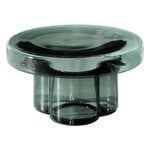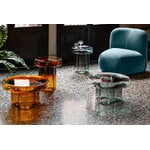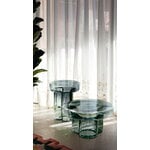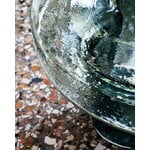Miniforms' Soda coffee table has an impressive and skilled design that makes a statement in any room. The thick, round tabletop is supported by a strong and robust leg, with a structure reminiscent of a delicate flower opening its petals – the soft image provides a joyous contrast to the table's otherwise sturdy design. The sculptural Soda table is the result of the skills of three glassmakers who together have blown and shaped a glass table with a unique look that will delight both homes and public spaces.





Soda coffee table, petrol green
Miniforms
Description
Miniforms' Soda coffee table has an impressive and skilled design that makes a statement in any room. The thick, round tabletop is supported by a strong and robust leg, with a structure reminiscent of a delicate flower opening its petals – the soft image provides a joyous contrast to the table's otherwise sturdy design. The sculptural Soda table is the result of the skills of three glassmakers who together have blown and shaped a glass table with a unique look that will delight both homes and public spaces.
Product details (9)
- Colour
- Petrol green
- Width
- 55 cm
- Depth
- 55 cm
- Height
- 30 cm
- Diameter
- 55 cm
- Measurement details
- Base diameter 35 cm
- Material
- Blown glass
- Weight
- 17 kg
- Care instructions
- Clean with water and neutral soap. Use a microfibre cloth to avoid any scratches.
- Product ID
Designer
Yiannis Ghikas (b. 1969) is a Greek designer known for his unique and innovative approach to furniture design.
One of his most notable designs is the ”Monarchy” stool, which received the Red Dot Design Award in 2009 and the German Design Award in 2016. He has also got the attention of the design world with the Soda tables, designed for the Italian brand Miniforms. Entirely made of mouth-blown glass, the table has won several prestigious awards and nominations, including the Archiproducts Design Award, the Azure Magazine Award and the Dezeen Design Award 2021.
View all productsReviews (0)
Sustainability
The Product Sustainability Framework, our criteria of sustainable design, helps you find the most sustainable products in our selection. Read below which sustainability criteria this product has met.
Working conditions & labour 8/9
-
Equal opportunities for all employees
-
Commitment to UN Global Compact, fair compensation for all employees
-
Corporate responsibility requirements defined and communicated for suppliers
-
Systematic work for improved inclusion and well-being in the workplace
-
Transparent supply chain
-
Suppliers' compliance to a code of conduct ensured
-
Direct suppliers audited and certified
-
Compliance to the UN Guiding Principles on Business and Human Rights ensured in the supply chain
-
Support for community involvement in the supply chain
Eco-friendly production 9/9
-
Fair and resource-wise water-use in production
-
No incineration or landfilling of returned items
-
No use of endangered species as materials
-
No direct environmental emissions or waste (excl. GHGs) from production
-
The sustainability of direct suppliers' production is addressed and monitored
-
Production and material sourcing that respect biodiversity, animal rights, and natural ecosystems
-
Material-efficient and ecological packaging
-
Positive impact on nature’s well-being through operations that regenerate natural ecosystems
-
No potentially harmful chemicals used in own production
Climate impact 6/8
-
Company's direct greenhouse gas emissions identified and commitment to reduction
-
Product's carbon impact identified and commitment to reduction
-
Guidance on energy- and eco-efficient use of the product
-
Low-carbon or compensated transportation
-
Carbon footprint of the product calculated and goals set to reduce it
-
100 % renewable energy in own production and operations
-
Contribution to climate initiatives beyond the brand’s direct operations
-
Carbon neutral or carbon negative product
Sustainable materials 6/6
-
Sustainable and long-lasting material choices
-
No harmful or hazardous substances
-
Responsible raw material sourcing and production
-
Materials suited for circularity: monomaterials, recyclable finishings, renewable or recycled contents etc.
-
Ecological materials: natural, biodegradable, recyclable or recycled contents
-
Outstanding materials in terms of innovativeness, responsibility, sustainability and circularity: local production or sourcing, 100 % recycled content, C2C-certification etc.
Circular design 4/5
-
High aesthetic quality promoting long-term use of the product
-
Technically durable product design and material choices
-
Design for enduring life-long quality
-
Design and support for product maintenance, repair and upgradability
-
Innovative circular design solutions: circular service system, resale platform, remanufacturing, collection of used products, etc.






